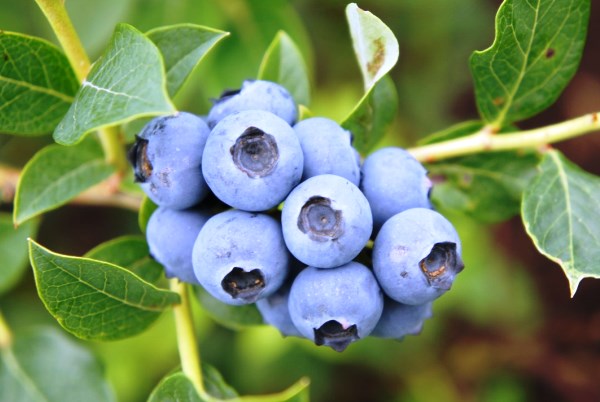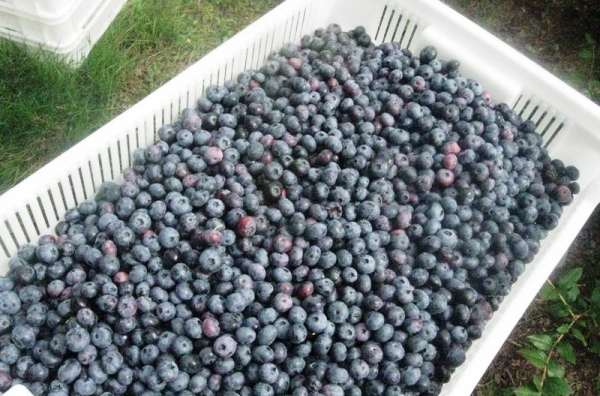Duke frost-resistant blueberry variety
Many types of useful berries migrated to our site straight from the forest. Scientists have ennobled the shrubs, developed new fruitful varieties, and adapted them to latitudes where they had never grown or matured before. The list, opened by raspberries and strawberries, has already been replenished with lingonberries and cranberries, and in recent years, the cultivation of blueberries is gaining popularity - berries are very useful for health and generous for the annual harvest. Among the varietal varieties, the most commonly grown garden blueberry is Duke.
Content
Description of the plant and advantages
The bushes of the garden plant are much taller, and the berries are larger than their forest relatives. The Duke variety, for example, grows up to one and a half to two meters, the shoots stretch up, not branching too much, like currants or gooseberries. The bush is therefore well warmed up by the sun, the berries ripen evenly, periodic thinning is not required at all.
Blueberries begin to bloom in May. You can't even say during this period that we have not an ornamental bush, but a berry one. Flowers resemble a bell in shape, have a pale pink color, on the branches of a shrub with a small number of leaves, they look very impressive. In some regions, during this period, sudden ground frosts and sharp drops in air temperature are possible. In May, this is especially unpleasant, because most of the berries are in bloom. Heat-loving plants often shed their color, so you can't wait for a harvest from them in such a year. But blueberry Duke is incredibly hardy to such disasters of nature, which allows you to enjoy its wonderful taste every year.
The leaves of the shrub have a beautiful decorative shape and color, they are especially amazing in autumn in a crimson decoration. Therefore, with the planting of berries, you will acquire on the site not only a useful, but also outwardly very attractive plant.
Characteristics of berries
Duke is a mid-season variety; it assumes the ripening of berries at the end of July. The berries are round in shape, they are quite large, reaching a diameter of up to 2 cm. The fruits are very juicy, in appearance they resemble blueberries, but with a lighter skin. Collecting them is a pleasure! They come off well from the bush, do not get crushed. And if the peel retains its integrity, then the shelf life is longer. They can be kept in the refrigerator for a while, which makes the blueberries even tastier. If desired, the fruits can be frozen for the winter. It tolerates transportation well.
Blueberries not only have tasty fruits, they are also very useful, because they contain a rich complex of vitamins C, B1, B2, A, K. Its use helps in the treatment of many diseases. In folk medicine, both fruits and leaves are used.
Agrotechnics
Growing blueberries, like any shrub, in a summer cottage has its own characteristics, ignoring which, you can get a low yield or cause the death of the bush with improper care.
The widespread description of the variety as a berry for shaded areas is fundamentally incorrect. Thinking that since in nature a bush grows in a swampy area of the forest, then similar conditions should be created for it in the garden, you will ruin the plant. This is the most common cultivation mistake. There are others - soil selection, watering, fertilization.
So that you do not have to be disappointed in the results of growing Duke blueberries, we will give a short description of the technology that will help anyone achieve a good harvest.
You need to plant blueberries in an open, well-lit area, preferably protected from the wind. However, despite the increased love for the sun, the Duke variety tolerates winter frosts down to -34 degrees.
The plant is demanding on the soil, it should be light and high acidity. Sandstones and peat bogs are good for growing. Favorable acidity - pH 3.5-5. If the soil does not reach these indicators, it is recommended to acidify using any acids at the rate of 20-30 g per bucket of water. You can water not the entire plot of land, but only a hole for planting a bush.
Gardeners recommend mulching the soil around the bush. You can use pine sawdust for this, lay them out in a layer of 8-10 cm. A plant planted once does not require transplanting for 20 years.
Blueberries love water, they need to be watered regularly, but do not overflow and stagnate water - this may cause the roots to die. Drying of the soil will also badly affect it. According to watering norms, the plant is similar to vegetables (carrots, potatoes, etc.)
Top dressing of the bush should be carried out every year. Blueberries need nitrogen fertilizers in a large dose, they should be supplemented with phosphorus and potassium fertilizers. It is impossible to use any kind of manure and compost for these purposes. For saturation with nitrogen, ammonium sulfate (35-40 g per bush) or ammonium nitrate (25-30 g per bush) is suitable. It is recommended to divide the nitrogen application rate into 3 stages: ½ - when the buds bloom, 30% - before flowering in May, 20% - during fruit ripening in early June.
Feeding with phosphorus and potassium is used twice: the main portion (2/3) - in early spring, the rest in June. For fertilizers, you can choose superphosphate and potassium sulfate.
As we have already noted, the variety tolerates frosts well, but if the winter is with little snow, the bush should be covered. In addition, take care of protection from hares - they like to peel the bark of blueberries. They begin to cut the bushes only from the age of 6, leaving 4 old and young branches each.
Video "Garden blueberry"
The video tells about the features of garden blueberries and how to care for them.





